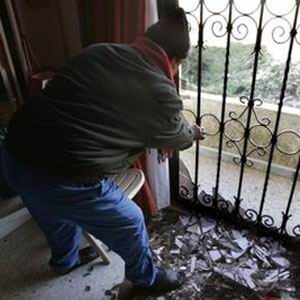Untitled Document
 |
|
(AP Photo) A Lebanese man removes shattered glass in his house after the Israeli strike
|
Israeli warplanes attacked a training base of a Palestinian resistance
group in the al-Naima area, south of Beirut, wounding two fighters, BBC reported.
The Israeli attack against the Popular Front for the Liberation of Palestine-General
Command (PFLP-GC) was the deepest inside Lebanon since June 2004.
The Israeli army claimed that the strike was in response to rocket attacks
at the northern Israeli towns of Kiryat Shmona and Shlomi on Tuesday night.
"This is in response to the firing of projectile rockets last night toward
Israeli communities," the army said, according to BBC.
Lebanese police said more than seven Katyusha rockets were launched from Lebanese
territory. Two were fired from the western sector, 20km south-east of Tyre,
and five others from the eastern sector on Adaisa hill.
Reports say the rockets caused some damages in northern Israel, but there were
no casualties.
The Lebanese resistance group HEZBOLLAH
and the Palestinian Fatah movement strongly denied that they were responsible
for the rocket attacks.
A PFLP-GC spokesman also denied any involvement.
"Israel wants to blame us for the rocket attacks to provoke a hostile
reaction against us in Lebanon," Anur Raja was quoted by AFP as saying.
"We say to our Lebanese brothers that we were in no way implicated."
Raja added that the Israeli air strike at 0430 (0230 GMT) had blown a hole
in a concrete wall.
Meanwhile, the top general for northern Israel, Maj. Gen. Udi Adam, vowed to
retaliate against future rocket attacks from Lebanon and did not rule out striking
Syrian targets.
"The main message that we passed and we are trying to give is that the
Lebanese government must take responsibility for what happens in its territory,"
said Adam, chief of the army's northern command, which monitors the sensitive
Israel-Lebanon border.
"If Kiryat Shmona residents don't sleep quietly, then the residents of
Beirut won't sleep quietly. This is an unequivocal message," Adam told
The Associated Press news agency.
Asked whether Israel would also bomb Syrian targets, Adam replied: "We
reserve the right to retaliate anyway we see fit."
Israel, under military pressure from HEZBOLLAH, pulled out its army from the
disputed border region in 2000, ending 18 years of occupation.

